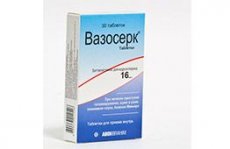Medical expert of the article
New publications
Preparations
Vasoserq
Last reviewed: 03.07.2025

All iLive content is medically reviewed or fact checked to ensure as much factual accuracy as possible.
We have strict sourcing guidelines and only link to reputable media sites, academic research institutions and, whenever possible, medically peer reviewed studies. Note that the numbers in parentheses ([1], [2], etc.) are clickable links to these studies.
If you feel that any of our content is inaccurate, out-of-date, or otherwise questionable, please select it and press Ctrl + Enter.

Vasoserk is a histamine-like drug acting on the vestibular system, ATC code N07C A01. Other trade names of the drug: Betahistine, Betagis, Betaserk, Betanorm, Betaver, Vestinorm, Vestibo, Vesticap, Vestahistine, Asniton, Avertid, etc.
Indications Vasoserka
The drug Vasoserk is used to treat the following vestibulocochlear disorders:
- Meniere's disease and syndrome;
- inflammation of the inner ear (labyrinthitis);
- acute peripheral vestibulopathy (vestibular neuritis);
- vertebrobasilar insufficiency of various etiologies;
- dizziness;
- tinnitus;
- progressive hearing loss due to hydrocephalus of the inner ear;
- encephalopathies associated with brain injury and surgery.
Vasoserk can also be used in complex therapy of cerebral circulatory disorders, including vascular atherosclerosis.
Release form
Release form: tablets of 16 and 24 mg (30 tablets in a package).
Pharmacodynamics
The active substance of the drug Vasoserk - betahistine dihydrochloride - inactivates the enzyme diamine oxidase, which blocks the release of the biogenic neurotransmitter
Histamine, and also activates its receptors (H1 and H3) in the inner ear and nuclei of the vestibular nerve.
This helps to increase microcirculation in the capillaries of the inner ear and stabilize the pressure of the endolymph filling the cochlear duct system and the spiral organ of the inner ear, reducing the intensity of dizziness, reducing tinnitus and improving hearing. In addition, Vasoserk dilates the blood vessels of the brain.
Pharmacokinetics
After oral administration, Vasoserk is rapidly absorbed in the gastrointestinal tract; maximum concentration in blood plasma is reached 3 hours after administration.
The binding of betahistine dihydrochloride to blood proteins is insignificant.
Vasoserk is metabolized in the liver, forming two metabolites that are eliminated in the urine, with a half-life of 4 hours and complete elimination of 72 hours.
Dosing and administration
The drug Vasoserk is taken orally, the standard dosage is 8-16 mg three times a day (after meals). The duration of the course of treatment is determined individually and can be several months.
 [ 1 ]
[ 1 ]
Use Vasoserka during pregnancy
The use of Vasoserk during pregnancy and lactation is contraindicated.
Contraindications
Vasoserk is contraindicated in cases of hypersensitivity to histamine, bronchial asthma, pheochromocytoma (tumor of the chromaffin cells of the adrenal glands), gastric ulcer or duodenal ulcer, and in patients under 18 years of age.
Side effects Vasoserka
Possible side effects of Vasoserk include: nausea, headache, dyspepsia, increased heart rate, a feeling of pressure in the head or chest, discomfort or pain in the epigastric region.
Overdose
Overdose of Vasoserk causes nausea, vomiting and convulsions. If such symptoms occur, you should wash out the stomach and take a sorbent, such as activated carbon.
Storage conditions
Storage conditions for Vasoserk: at a temperature not exceeding + 28-30°C.
 [ 4 ]
[ 4 ]
Shelf life
Shelf life: 24 months.
Attention!
To simplify the perception of information, this instruction for use of the drug "Vasoserq" translated and presented in a special form on the basis of the official instructions for medical use of the drug. Before use read the annotation that came directly to medicines.
Description provided for informational purposes and is not a guide to self-healing. The need for this drug, the purpose of the treatment regimen, methods and dose of the drug is determined solely by the attending physician. Self-medication is dangerous for your health.

